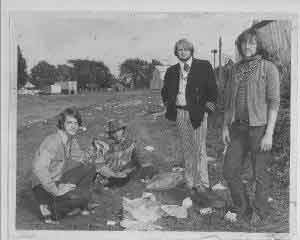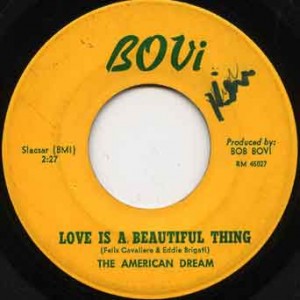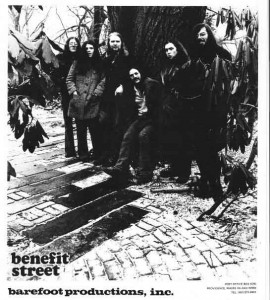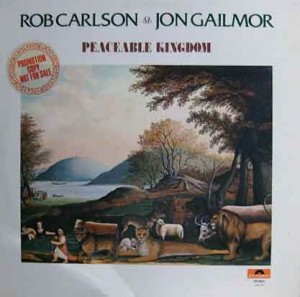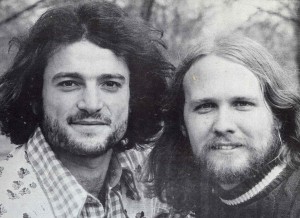Benefit Street/The American Dream
BENEFIT STREET & THE AMERICAN DREAM
The story of the Brown University-based band Benefit Street is a case study in the machinations of the music business during the “underground music” phase of Rock ‘n’ Roll in the late 1960s/early 1970s. It is the story of a great, local act that “should have made it big”, but circumstances just seemed to conspire against them. Their legacy, however, lives on as they released a record which is now a highly collectible garage single and they provided the jumping off point for several successful show business careers, most notably singer-songwriter Rob Carlson and voice-over artist Paul Payton.
The group, formed around lead guitarist Al Silverman and lead singer Rob Carlson, began in 1967 as The Slithy Toves (after the slimy badgers in Lewis Carroll’s “Jabberwocky”). Quickly realizing the name would lead to much mispronunciation and misinterpretation, they soon changed their name to the more consumer-friendly The American Dream.
The Dream quickly became fixtures on the Rhode Island college campus and teen scenes and were noticed by Bob Bovi, the owner of an independent record shop in downtown Providence, Rhode Island, Bovi’s records. Bovi invested in the group and produced an independent single on his own label: Bovi Records RM-45027. Bob and the group chose the two cover songs for the release wisely: the A-side was The Young Rascals’ extremely popular “Love Is A Beautiful Thing” (which the Rascals had missed out on charting with by relegating it to the B-side of “You Better Run”) and the B-side was an energetic cover of The Lovin’ Spoonful’s “Jug Band Music” which played up to the Country-Rock/Folk-Rock strengths of the band. The record shot to the top of the Rhode Island charts, peaking at #8 on WICE-AM chart, and put the group firmly on the map. (The record has since become a highly sought-after garage rock collectible fetching upwards of $100.00 on the worldwide market.)
Simultaneously to the release of the single, Bob was asked to take over the entertainment bookings for Bovi’s Tavern in East Providence, owned by his cousin John Bovi’s family. From its inception in 1948, Bovi’s had been presenting only Dixieland jazz, but business had been steadily falling off. Bob, well aware of the shift on the club scene to Rock ‘n’ Roll and a younger clientele, laid off the house band, Tony Tomasso & The Jewels Of Dixie, and installed The American Dream at the Tavern on the weekends. Between the buzz surrounding the record and the band’s ever-growing following, the plan worked perfectly. The club was revived and was soon presenting Rock and Blues six nights a week. (Thanks to Bob’s efforts, Bovi’s Tavern became a hub of the burgeoning underground music scene and the birthplace of Rhode Island musician Ken Lyon’s Tombstone Blues Band. It is still in operation to this day, but that’s another story…)
Between the success of the single and sell-out crowds at their club dates, The American Dream had reached the top of the Rhode Island music scene. But despite the strong sales and record company interest, a major label contract failed to materialize. The group soldiered on for another couple of years, with several personnel changes, until the The American Dream changed its name to Benefit Street to avoid confusion with a popular Philadelphia band of the same name who were about to release an album on Ampex Records. (They were named after the actual Benefit Street on the East Side of Providence in the heart of the Brown University/Rhode island School of Design community which had become the “hippie” center of Rhode Island boasting the area’s largest concentration of head shops, clothing stores, record and music stores, coffeehouses and other music venues.)
The band had evolved from their garage rock beginnings into a pioneering folk-rock unit. Their earliest tapes were on a par with the sounds coming out of New York (such as the Spoonful’s fourth album, “Everything’s Playing” featuring “Six O’Clock”) and Los Angeles (The Byrds’ fifth album, “The Notorious Byrd Brothers” with “Goin’ Back” and “Wasn’t Born To Follow”). As the personnel changed, they grew with the times, losing the psychedelic tinges, but gaining a new maturity by incorporating their deep folk and country roots further into the music while never losing their Rock ‘n’ Roll edge. The material was world-class and could have easily competed with comparable classics from the era ( the first Crosby, Stills & Nash album, “Everybody Knows This Is Nowhere” by Neil Young & Crazy Horse, James Taylor & The Section with “Sweet Baby James” and “Mud Slide Slim”, and Carole King and The City/Jo Mama axis with “Writer” and “Tapestry”).
In performance, the group was astonishingly good throughout the changes in lineup. Each version of the band seemed better than the last. They had the ability to make any venue their own – they could achieve intimacy at a rowdy dance party or excitement in a somber coffeehouse setting. They were extremely tight, but knew how to rock out and jam. The level of musicianship was world class and the vocals and harmonies were exquisite.
Benefit Street became one of the top draws in New England and were widely thought to be the act most likely to succeed.
The group continued recording on a regular basis under the aegis of Jim Israeloff who’d taken over their management from Bob Bovi. Israeloff was a co-owner of The Beacon Shops in Providence, one of the largest music stores and record distributors in the state. Using their popularity on the college campuses and underground club scene, the group managed to get heavy airplay for their demos on college radio and FM stations all over New England most notably on WBRU at Brown University in Providence and the mighty WBCN in Boston. (An instrumental by the band from these tapes, “20 Pound Turkey”, was used by ‘BRU for several years to lead into the news.) Israeloff in the meantime was using his record company connections to pursue a major label contract for the band.
Despite the heavy airplay, sold out shows all over New England, and much serious consideration by the majors, a contract failed to materialize and the group called it a day in 1972.
Rob Carlson continued to pursue a musical career, first as a solo acoustic performer, but soon teaming up with another of the area’s most popular folk singers, Jon Gailmor from Philadelphia. Carlson & Gailmor became a top draw on the coffeehouse circuit throughout New England and New York and were signed by Polydor Records in 1973. Their album, “Peaceable Kingdom” (released in 1974), was a mid-level success and the duo achieved national recognition touring extensively. The album is nowadays a prized collectible of the “singer-songwriter” era and is highly recommended to any folk music enthusiast or fan of Rhode Island music. (Although it’s never been reissued on CD, the LP is definitely worth seeking out on eBay, Amazon, GEMM, etc. Listen to the title track here:
Carlson & Gailmor-Peaceable Kingdom
The music business being what it is, no second album materialized and Carlson & Gailmor split up after a couple of years.
Gailmor went on to a very successful career as a solo artist which continues to this day. Carlson has had much success in several areas of the music business most notably as a producer of radio commercials and jingles and as a member of Modern Man, a folk-comedy trio which also featured songwriting legend David Buskin. He has resumed his solo career with a new album, “Pieces of Paradise” released in 2010.
Paul Payton parlayed his experiences into a long and successful career as a broadcaster and voice-over talent whose work is well-known throughout New England and New York.
The Benefit Street story continues today. In 2010, in preparation for this Archive entry, I got in contact with Rob Carlson to find out if any of the band’s recordings still existed. Although he did not have any tapes himself, Carlson started making inquiries to the band members for me. After contacting Paul Payton, things started to snowball. All members were reached and everyone put whatever tapes they had into the pool. Payton was able to assemble the complete recordings of Benefit Street and, after digitizing and remastering, has released them as a CD (including both sides of The American Dream single courtesy of Bob Bovi who donated the last-known mint copy of the 45 to the project). The group has a beautiful website featuring their complete story and many historic photographs and memorabilia. And finally, as of this writing (February, 2011), Carlson and Payton have reunited in a new band called Rob Carlson & Benefit Street (which features a Rhode Islander, multi-instrumentalist Vincent Pasternak). Please visit the links below for more detailed information and current news about these great musicians who wrote such a wonderful chapter in the story of Rhode Island music.
– Rick Bellaire, February, 2011
EXTERNAL LINKS & RESOURSES
Benefit Street/The American Dream
http://www.presenceproductions.com/BSAD.html
Rob Carlson & Benefit Street
www.robcarlsonmusic.com
Rob Carlson/Modern Man
http://www.modernman3.com/
Paul Payton
http://www.paulpayton.com/
Paul Payton’s new album with his studio group, The Fabulous Dudes with Bobby Nelson
www.presenceproductions.com
